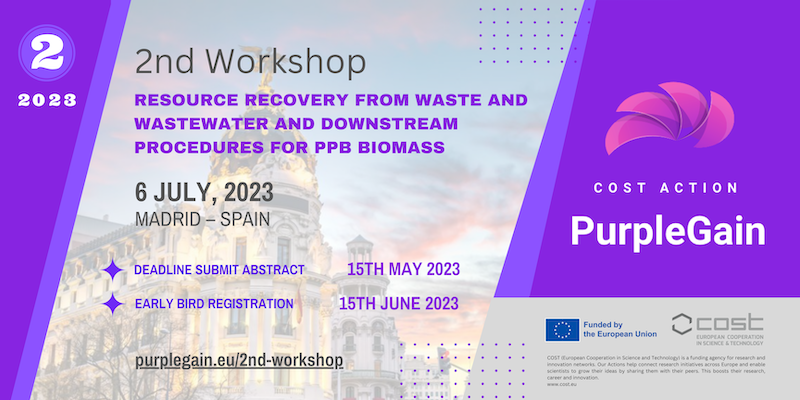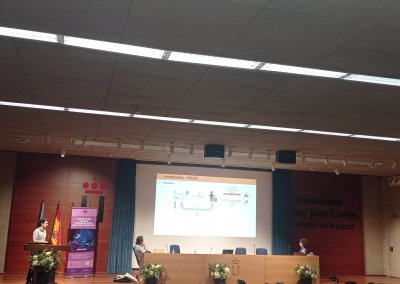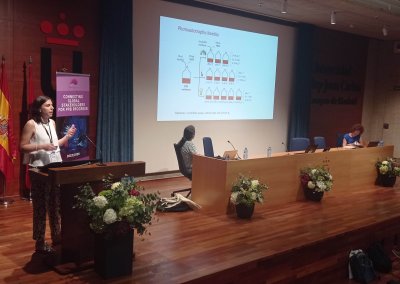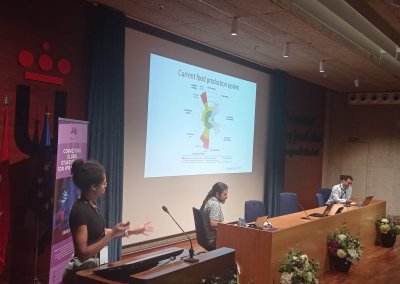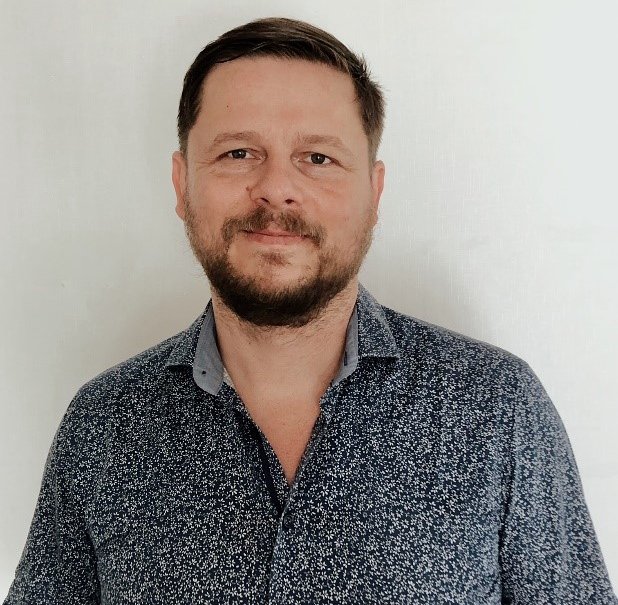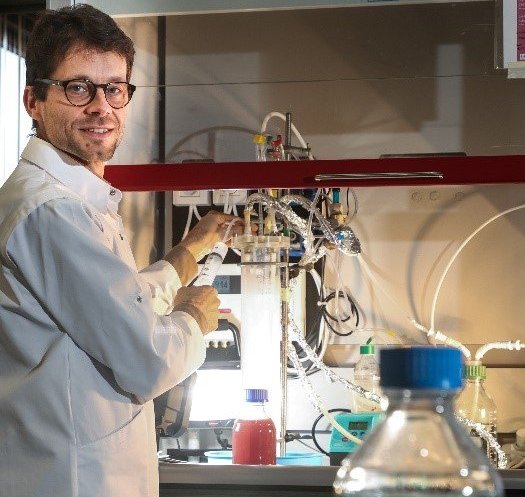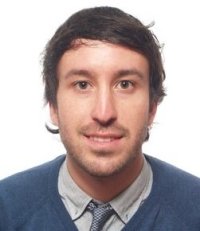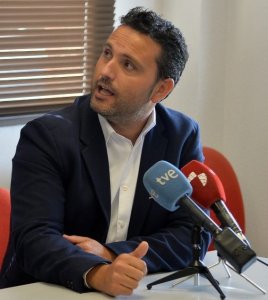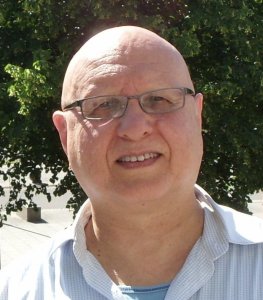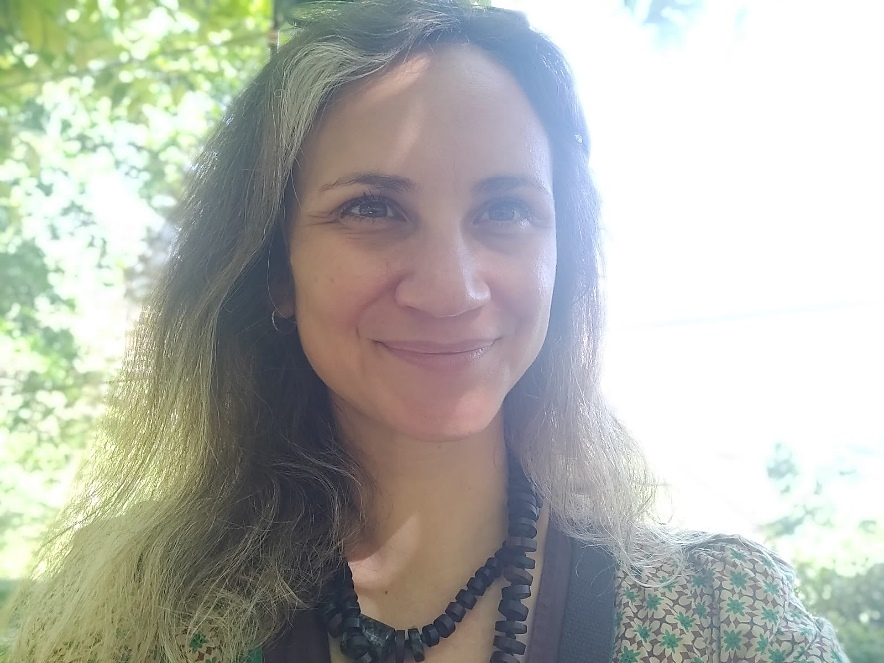2nd Workshop
Resource recovery from waste and wastewater and downstream procedures for PPB biomass
6th July 2023
Madrid – Spain
KEY DATES
- Extended Final date to submit abstracts: 31st May 2023 (Template)
- Communication, confirmation and funding (if applicable in the form of reimbursement): 7th June 2023.
- Early bird registration: 15th June 2023.
- Workshop date: 6th July 2023.
COST Action
COST Action CA21146
COST Action CA21146 is a four-year networking action that aims at creating a European network to share information, facilitating technology and knowledge transfer between the academic and industrial sectors, related to Purple Photosynthetic Bacteria (PPB) applications for resource recovery from organic waste sources. Resource recovery includes wastewater or organic waste, open or closed environments, in single or chain processes.
The network associates fundamental-focused and applied research groups, improving lab-scale technology optimization through mechanistic modeling. It benefits the technology transfer from applied-research groups to industry, considerably improving process design. PURPLEGAIN also aims to create a database for techno-economic, social and environmental impacts studies, which facilitates the marketability of both the PPB-based technologies and the products to extract. Some focused products are polyhydroxyalkanoates, single-cell proteins, biomass for energy, biomass as fertilizer, biohydrogen, carotenoids, terpenoids, organic acids, coenzyme Q10, and 5-aminolevulinic acid.
COST
COST is an intergovernmental framework for European Cooperation in Science and Technology established to initiate networking and coordination of nationally funded research activities on a European level. It facilitates bringing good scientists together under light strategic guidance based on networks, called COST Actions, centred around research projects in fields that are of interest to COST countries and cooperating countries.
2nd Workshop
Presentation
The workshop is organized by Dr. Daniel Puyol (Chair and head of the local organizing committee), Dr. Ioanna Vasiliadou (Training Schools Coordinator), Dr. Gabriel Capson Tojo (Working Group 2 Leader), Dr. Joana Fradinho (Vice Chair)., in the frame of WG 2: Resource recovery from waste and wastewater and downstream procedures for PPB biomass of the COST action (CA21146) – PURPLEGAIN.
- Celebration date: 6th July 2023, Madrid, Spain
- Location: The workshop will be celebrated at the Auditorium of the Library Building at the Campus of Vicalvaro (Madrid) of the University Rey Juan Carlos.
- Registration: Second Workshop – Registration
Key dates
- Final date to submit abstracts: 31st May 2023 (Download Template)
- Communication, confirmation and funding (if applicable in the form of reimbursement): 7th June 2023.
- Early bird registration: 15th June 2023.
- Workshop date: 6th July 2023.
Scope
PURPLEGAIN aims to create a European network to share information, facilitating technology and knowledge transfer between the academic and industrial sectors, related to PPB applications for resource recovery from organic waste sources. Resource recovery includes wastewater or organic waste, open or closed environments, in single or chain processes. The network associates fundamental-focused and applied-research groups, improving lab-scale technology optimization through mechanistic modeling. It benefits the technology transfer from applied-research groups to industry, considerably improving process design. PURPLEGAIN also aims to create a database for techno-economic, social and environmental impacts studies, which facilitates the marketability of both the PPB-based technologies and the products to extract. Some focused products are polyhydroxyalkanoates, single-cell proteins, biomass for energy, biomass as fertilizer, biohydrogen, carotenoids, terpenoids, organic acids, coenzyme Q10, and 5-aminolevulinic acid.
Accordingly, the workshop in the frame of Working group 2, which coordinates the initiatives focused on applied research, exploring operational strategies for combined product development, is focused on two main Topics: (i) wastewater treatment with purple phototrophic bacteria and resource recovery from organic waste sources in purple photo-biorefineries, and (ii) downstream processing: advances in extraction and purification of high added-value molecules, and engineering challenges: scale-up of photo-bioreactors, including control and light integration.
Call for participanting
This is a call for participating in the 2nd Workshop “Resource recovery from waste and wastewater and downstream procedures for PPB biomass” in the frame of WG 2: Resource recovery from waste and wastewater and downstream procedures for PPB biomass of the COST action (CA21146) – PURPLEGAIN.
We invite abstract contributions for oral presentations to this interdisciplinary workshop from all academic disciplines (PhD student, young researchers, post-doctoral and senior researchers, and professors) and other stakeholders that address the following issues of the two main topics:
- Wastewater treatment with purple phototrophic bacteria and resource recovery from organic waste sources in purple photo-biorefineries.
- Downstream processing: advances in extraction and purification of high added-value molecules, and engineering challenges: scale-up of photo-bioreactors, including control and light integration.
Rules for abstract submission
- Abstracts should have a maximum of 350 words (download the Abstract Template).
- Contributors could apply for financial support (see financial support section).
Program
8:30-9:00 | Registration
08:50 – 09:00 | Welcome from the Local Organizer. Dr. Daniel Puyol
9:00-15:20 | Session I. Wastewater treatment with purple phototrophic bacteria and resource recovery from organic waste sources in purple photo-biorefineries
09:00 – 10:00 | Dr. Tim Hülsen, (CEO at Fouling Doctors, Australia)
10:00 – 10:30 | Prof. Siegfried Vlaeminck (Department of Bioscience Engineering, Antwerp, Belgium)
10:30 – 11:00 | Dr. Luis Diaz Allegue (ANFACO-CECOPESCA, Spain)
11:00-11:20 | Coffee-Break
11:20-13:00 | Oral presentations I
11:20 – 11:35 |Amanda Prado de Nicolás, A. Ventura, Y. Segura, I. Pariente, M. Ventura, J A. Melero, F. Martínez, D. Puyol
Domesticating Purple Phototrophic Bacteria for Sustainable and Secure Protein Production Through the Photo-electro-biorefinery of Pig Manure
11:35 – 11:50 |G. Tassinato, P. Cerchier, A. Stoppato, Marco Biasiolo, C. Cavinato
An insight on Purple-B project: Hydrogen production from immobilized cells in photo bioreactors
11:50 – 12:00 |Luca Bernabò, G. Daly, G. Mugnai, V. Galli, L. Granchi, A. Adessi
Production of poly-β-hydroxybutyrate from bread wastes by sequential lactic and photofermentation
12:00 – 12:10 |Sultan Shaikh, G. McKey, H. Mackey
Assessment of fuel synthesis wastewater strength on treatment and resource recovery using phototrophic mixed culture in biofilm photobioreactor.
12:10 – 12:20 |Juliana Roda Almeida, E. Serrano León, E.L. Corona, J.C. Fradinho, A. Oehmen, M.A.M. Reis
Understanding the role of ammonia in PHA production with a Light- Feast/Dark-Aerated-Famine operated phototrophic-chemotrophic consortium
12:20 – 12:30 |María del Rosario Rodero, J.A. Magdalena, J.-P. Steyer, R. Escudié, G. Capson-Tojo
Single cell protein production from H2 by purple bacteria enriched cultures: influence of environmental conditions on microbial kinetics
12:30 – 12:40 |David G. Weissbrodt, A. Alloul, J. L. Rombouts, R. E. F. Lindeboom, Z. L. Forgereau1, M. P. Giulianetti de Almeida, M. Cerruti
Ecological engineering of microbial mixed cultures by combining fermentation and photoorganoheterotrophy to valorise carbohydrate-rich water residuals
12:40 – 12:50 |Miguel Palhas, D. Puyol, J. Fradinho and M.A.M Reis
Inhibition effects of PET degradation products on Purple Phototrophic Bacteria
12:50 – 13:00 |Sandra Chacón-Aparicio, J. Villamil, R. Molina & D. Puyol
Co-treatment of mixed urban wastes using mixed cultures of purple phototrophic bacteria for incorporation into the circular economy through high-value-added products
13:00-15:00 | Lunch Break
15:00 – 15:10 |Hartmut Grammel, O. Hädicke, C. Autenrieth, R. Ghosh
Utilization of biogenic wastes to produce value-added compounds in microaerobic dark bioreactor cultivations with Rhodospirillum rubrum
15:10 – 15:20 |Laura Foix, P. M. Binder, A. Pabón, L. Paredes, S. Ponsá
Evaluating the feasibility of purple bacteria culture for resources recovery from organic by products of the vegetal beverage industry
15:20-18:00 | SESSION II. Downstream processing: advances in extraction and purification of high added-value molecules, and engineering challenges: scale-up of photo-bioreactors, including control and light integration
15:20 – 16:20 | Dr. Victor Monsalvo Garcia (Head of Eco-efficiency Area – Aqualia, Madrid, Spain)
16:20 – 16:50 | Prof. Robin Ghosh (Institute of Biomaterials and Biomolecular Systems, Universität Stuttgart)
16:50 – 17:20 | Dr. Alessandra Adessi (Department of Agriculture, Food, Environment and Forestry Technology, University of Florence, Italy)
17:20-18:00 | Oral presentations from Applicants
17:20 – 17:35 |Michal Koblížek, Nupur, P. Hrouzek, J. Cheel, M. Kuzma
Purification and structural analysis of novel carotenoids from phototrophic bacteria
17:35 – 17:50 |Rossella Labarile, P. Veronico, V.Ancona, M. Trotta
Plant promoting growth and soil bioremediation by Rhodobacter sphaeroides
Industrial activities, pesticides, and improper waste disposal represent the main anthropogenic activities
responsible for soil pollution. The Italian government in 1998 listed fourteen nationally relevant polluted sites in
urgent need an environmental remediation [1]. Among these sites, the city of Taranto – located in southern Italy –
and its nearby industrial area is included as highly polluted district.
The presence of a very large steel industry, an oil refinery, a power plant, and a set of dockyards contributed
altogether to the release of multiple and toxic pollutants in the environment. Although several studies were and
are published focused on air and water pollution, few reports evaluated soil contamination of this area.
Investigation on chemical and physical parameters (pH, electrical conductivity, available P, Organic C) and
contaminant analyses of soil samples collected from a multi-contaminated area located close to Taranto were
performed, [2] showing the presence of hazardous toxic pollutants, such as heavy metals (HMs) and
polychlorinated biphenyls (PCBs). These pollutants are persisting and tend to bioaccumulate along the food-chain.
Effective and sustainable decontamination methods are hence highly needed. Based on the synergistic action
established between plant root system and soil rhizosphere microorganisms, Plant Assisted BioRemediation has
been proved to be efficient in restoring quality of contaminated soils [2, 3].
In this work, the purple non-sulfur bacterium Rhodobacter sphaeroides, a prokaryote able to convert sunlight into
other forms of energy by photosynthesis, was used as plant growth-promoting rhizobacteria. Due to its metabolic
versatility and ability to grow in presence of heavy metals [4, 5], R.sphaeroides can be exploited for environmental
applications, such as bioremediation of polluted sites.
Here, the effect on the growth of Arabidopsis thaliana in PCBs and HMs-contaminated soil from Taranto area,
inoculated with bacterial cells of the wild type 2.4.1 of R. sphaeroides was assessed. These preliminary results
obtained in growth chamber in controlled conditions pose the foundation for the development of a more sustainable
management system for soil bioremediation.
17:50 – 18:00 |Naïm Blansaer, J. Spanoghe, A. Alloul and S. E. Vlaeminck
Microbial protein based on renewable power and CO2: Hydrogenotrophic cultivation of purple bacteria in a photobioreactor
18:00-18:30 | Coffee-Break
18:30-20:00 | Round table discussion on “Improving the productivity of photobioreactors based on smart design”
Moderators: Dr. Daniel Puyol, Chair of the COST action, and Dr. Gabriel Capson-Tojo, WG2 leader.
Speakers
Accommodation and Transportation information
Room rates
Room rates of University Residence José Pérez de Vargas
| Appellation | Room rates in EUR/room/night |
| Single/double room single occupancy | EUR 42 (VAT included) |
More information
About the price
- The price includes accommodation and a rich buffet breakfast. More information about the Residence’s Services and Facilities can be found here.
- In order to make reservations, please send an email to reservas@residenciavicalvarourjc.com.
- In the email concept please indicate “Reservation code: CA 21146 COST PURPLEGAIN – 2nd Workshop”.
- Please make your reservations before 31st May 2023. Extended until June 11th.
Payment method
- Reservations will be paid in advance through bank transfer. Once you make the reservation via email, the University Residence will provide you with the details to make the bank transfer. This transfer can be made up until a week before, upon arrival.
- Prices include VAT and service fee.
Parking
- There is on-site free parking with sufficient parking spots for all participants.
Policy of penalty cancellation
- Penalty-free cancellation deadline: participants can cancel their reservation up until a week before upon arrival without penalty.
- Penalty: After the deadline, the price will be charged in full.
Our Remarks
A) Transport from (to) Barajas Airport (Madrid) to (from) the University Residence José Pérez Vargas:
1) Subway (Metro): The Adolfo Suárez Madrid-Barajas Airport currently has four terminals. Metro de Madrid is conveniently accessible from any of them using the two stations located at the airport: Aeropuerto T1-T2-T3 Station and Aeropuerto T4 Station, both on 8 train (L8, pink line). The opening hours are from 6:00 a.m. to 1:30 a.m.
- Instructions: get the 8 train (pink line) from the Airport to “Colombia” station. There are transfers to the 9 train (purple line) direction “Puerta de Arganda” until “Vicálvaro Station”. From the “Vicálvaro Station” is a 5-minute walk.
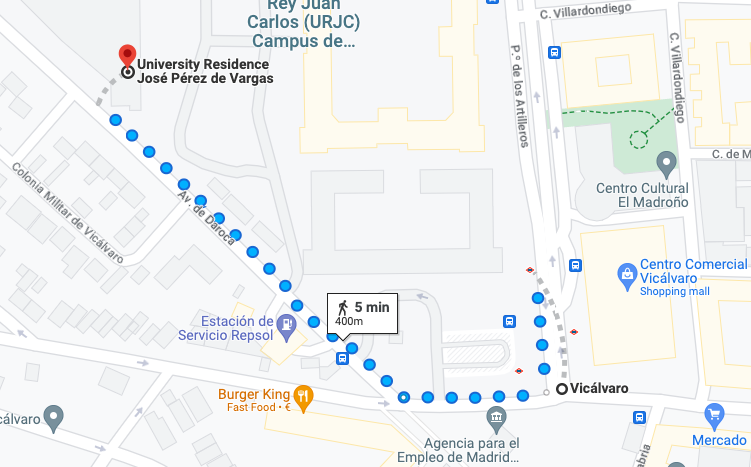
- Metro tickets (Multi Public Transport Card, more information) can be purchased from the ticket machines located in stations. You can also check the balance on your ticket at these machines.
- To travel from and to the Airport, you will have to pay an extra fee
2) Car transfer/taxi: You can also get a taxi from the Airport (around EUR 30) or download one of the car transfer apps (such as Cabify, Uber or Bolt) (around EUR 20). Some of these transfer services also work with taxis. These are personal recommendations. The URJC does not accept any liability for the use of these services.
B) City Mapper
- We recommend downloading the City Mapper app: https://citymapper.com/?lang=en. We consider it a very useful tool to move out and about, wherever you are, not only Madrid.
C) Tips about life in Madrid
- For more useful tips about life in Madrid: https://www.urjc.es/images/facultades/hrs4r/documentos/v.1_Manual_de_bienvenida_ENG.pdf.
D) Other services
- There are several swimming pools in the surroundings of the University Residence (Centro Deportivo Municipal Faustina Valladolid, Centro Deportivo Municipal Margot Moles – Vicálvaro, Centro Deportivo Municipal La Elipa).
- You can purchase your tickets online. Clic on “Acceso no identificado” and then, in the “Entradas de uso libre” section select “Nado libre en piscina cubierta”.
- You can also make reservations via the “Madrid Móvil” app. Once you download the app (either in Play Store or the App Store), you must clic on “Madrid es Deporte” and then in the “Entradas de uso libre” section, select “Piscina de Verano”. The price for the whole day is of EUR 5 (there are discounts for children under 13 and people over 65 years old).
- Do not forget to take a swimsuit with you. Temperatures in Madrid during July are usually quite high (minimum 20oC – maximum 35oC).
Location
Campus of Vicalvaro (Madrid) of the University Rey Juan Carlos (Spain)
P.º de los Artilleros, 38, 28032 Madrid
Financial Support – Application procedure for reimbursement
Documentation for applying
The documentation needed for applying for reimbursement are as follows:
- Applicants must upload a short Curriculum Vitae (in English).
- Applicants must upload a motivation letter (in English).
- Applicants must upload a scanned copy of their passport (if applicants do not have a passport, they can upload their national ID card)
Please, check the General Rules to be reimbursed.
Selection criteria
The selection criteria for participants that will be eligible for reimbursement will comply with the COST Excellence and Inclusiveness Policy, in the implementation of the Action and will encourage attendance by a diverse selection of participants in consideration of:
- Underrepresented groups, including those with disabilities. Priority will be given to underrepresented groups, including those with disabilities.
- Gender balance.
- The level of involvement of Inclusiveness Target Countries (ITCs). Priority will be given to participants from Inclusiveness Target Countries. The current list of ITCs include: Albania, Armenia, Bosnia and Herzegovina, Bulgaria, Cyprus, Czech Republic, Estonia, Croatia, Georgia, Greece, Hungary, Lithuania, Latvia, Malta, Moldova, Montenegro, Poland, Portugal, Romania, Slovenia, Slovakia, Republic of North Macedonia, Republic of Serbia, Turkey and Ukraine.
- The level of involvement of Early Career Investigators (ECIs). Priority will be given to PhD students and young post-doctoral researchers, followed by senior post-doctoral researchers and professors.
- In addition, workshop organizers may also consider other special attributes such as
- Type, or level of expertise in the field of the Workshop based on the curriculum vitae,
- Appropriate core knowledge and understanding
- Willingness to participate based on the motivation letter
- Demonstrated interest based on the motivation letter,
- The positive impact that the participants will have on the applicant’s future carrier and
- Willingness to make a presentation in the Workshop session.
Financial support through reimbursement does not necessarily cover all expenses but is a contribution to the overall travel, accommodation and meal expenses.
Financial contribution
Financial support through reimbursement does not necessarily cover all expenses but is a contribution to the overall travel, accommodation and meal expenses.
The financial contribution for each successful applicant shall respect the following criteria:
- Up to a maximum of EUR 450 in total can be afforded to each successful applicant from ITC country.
- Up to a maximum of EUR 250 in total can be afforded to each successful applicant from non-ITC country.
- Up to a maximum of EUR 150 in total can be afforded to each successful applicant from Spain.
Please remind that this financial contribution must be understood as financial aid aimed to help applicants to cover the expenses of their participation in the Workshop.
This financial aid does not aim to cover 100% of the expenses.
Please see the General Rules to be reimbursed.
Evaluation process and result announcement
Evaluation process
The selection committee, composed of the Action Chair, the Vice Chair, the Grant Awarding coordinator, the Training Schools Coordinator and the WG1 Leader, will evaluate the applications within a month after the abstract submission deadline and will inform the successful evaluated applicants. The successful applicants will then receive an e-mail from the grant holder (Grant Letter Notification), stating the official approval of the reimbursement, the granted budget and a payment request form which must be completed after the completion of the Workshop.
Criteria of reimbursement
If the amount of reimbursement by all applications within a call does not exceed the available budget, the applications are handled by the selection committee. If there are more applications than funding is available, the following procedure takes place.
- A list of all applications (containing an informative summary) is distributed to all members of the selection committee in form of a table in which every evaluator can mark which applications he or she can evaluate according to their field of expertise.
- To guarantee a fair and objective evaluation, an evaluator should have no affiliation with neither the home nor the host institution of the application in question.
- All applications are evaluated by two members of the selection committee. The Grant Awarding coordinator distributes the proposals to the individual evaluators.
- The criteria given in the table below shall be applied for evaluation. The first criterion (a) is assessed by the Grant Awarding coordinator prior to the evaluation process.
| Criterion | max. points |
| a) Before any further criteria are considered | |
| Application is complete and fulfils all formal requirements | pass/no pass |
| The application will be ranked last if the applicant was granted in previous call | pass/no pass |
| b) Evaluation of the proposal | |
| Applicant from ITC country | 0 or 10 |
| Applicant is ECI (or promotes gender balance) | 0 or 10 |
| Impact on the career of the applicant | 15 |
| Willingness to participate based on the motivation letter | 10 |
| Willingness to make a presentation in the Workshop session | 10 |
| CV of the applicant | 10 |
| Relevance to the objectives of PurpleGain Action | 20 |
- The evaluators report their evaluations to the Grant Awarding coordinator.
- The Grant Awarding coordinator ranks all evaluations and then reports the final result to the selection committee to be discussed and accepted.
- The applicants are informed about the decision reached.
More information
For further information, you may contact the
- Dr Daniel Melchor Puyol Santos – Chair
- Dr Ioanna Vasiliadou – Training Schools Coordinator
- Dr Raul Muñoz Torre – Grant Awarding Coordinator
- Dr. Ioanna Vasiliadou – Training Schools Coordinator

